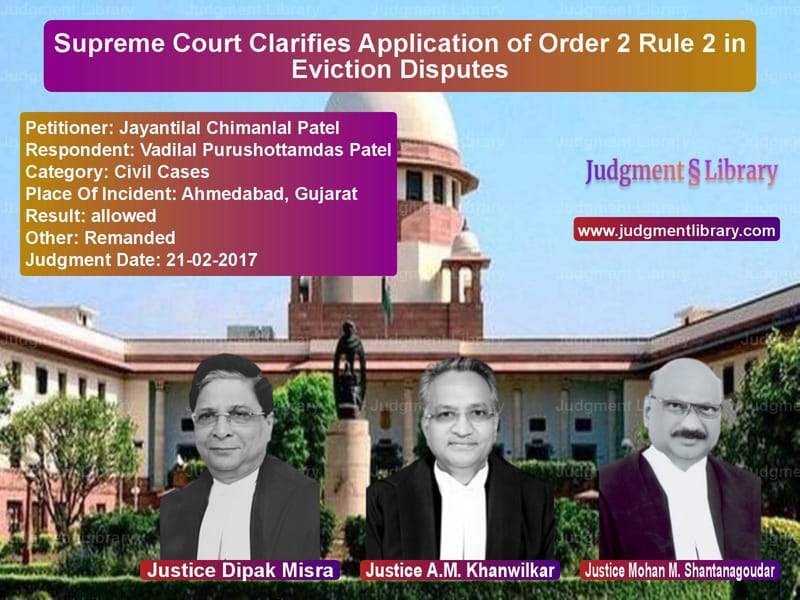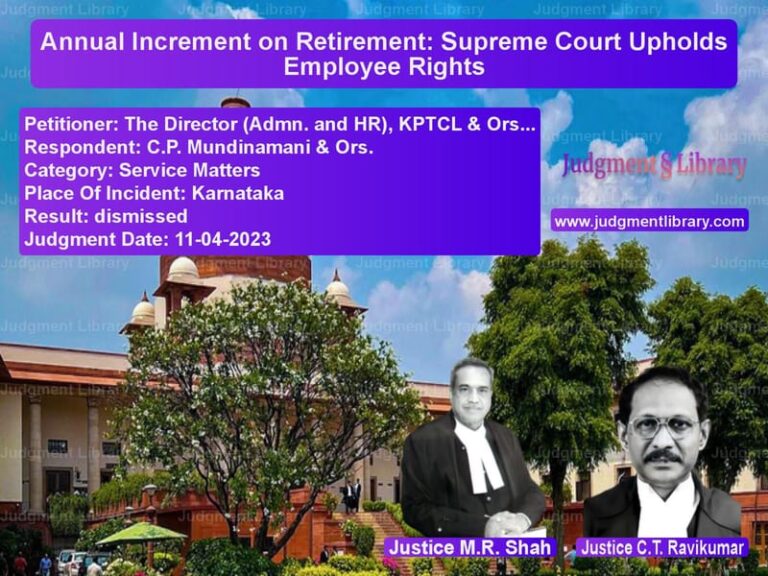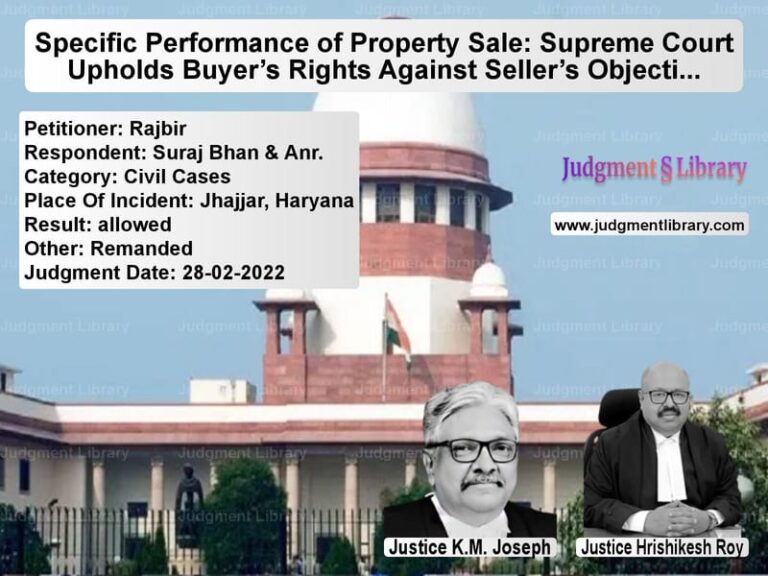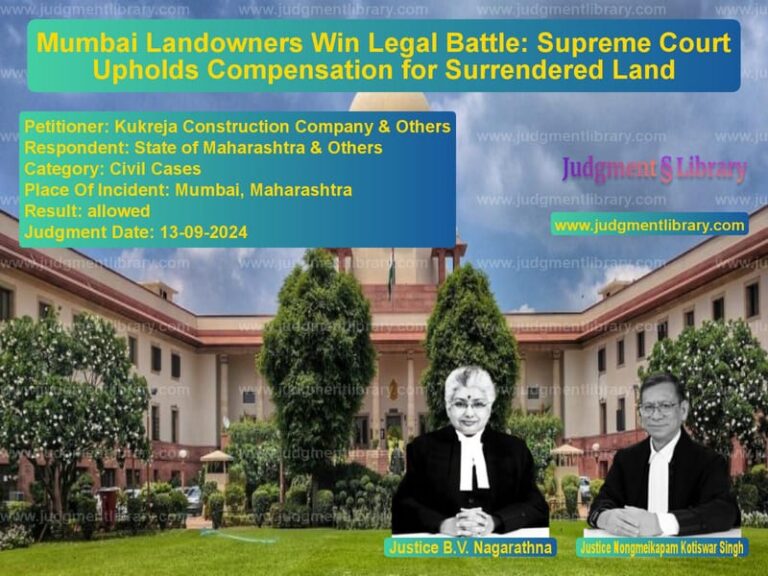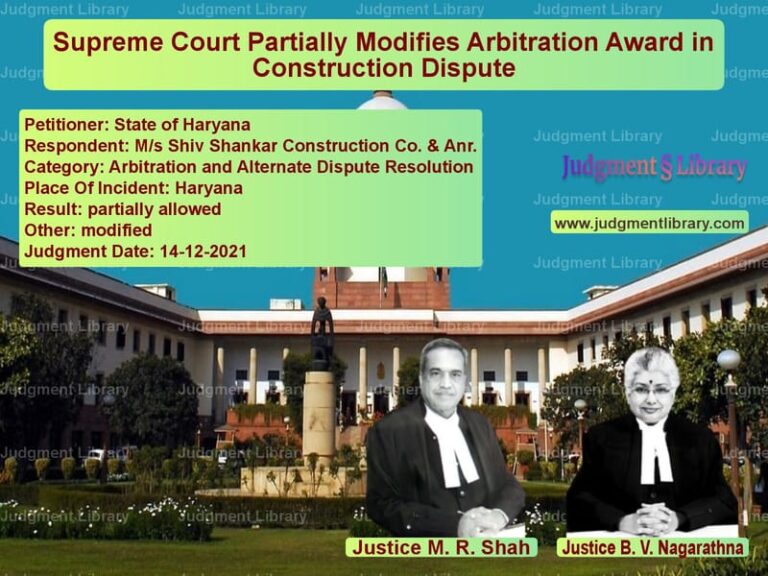Supreme Court Clarifies Application of Order 2 Rule 2 in Eviction Disputes
Introduction
In a landmark ruling, the Supreme Court of India in Jayantilal Chimanlal Patel v. Vadilal Purushottamdas Patel addressed key legal issues related to eviction, subletting, and permanent construction on tenanted premises. The case primarily revolved around the application of Order 2 Rule 2 of the Code of Civil Procedure (CPC), which bars a plaintiff from filing a second suit on the same cause of action if the claim could have been raised in the first suit.
The judgment, delivered by a bench comprising Dipak Misra, A.M. Khanwilkar, and Mohan M. Shantanagoudar, provides significant clarity on procedural requirements for proving a plea under Order 2 Rule 2 CPC and reinforces the principle that eviction laws must be strictly enforced to protect the rights of landlords.
Background of the Case
The dispute arose between the appellant-landlord, Jayantilal Chimanlal Patel, and the respondent-tenant, Vadilal Purushottamdas Patel. The appellant had initially filed a suit seeking a permanent injunction against the tenant, restraining him from constructing any permanent structures on the rented premises and from subletting it. The trial court partially decreed the suit, restraining the respondent from subletting or transferring the premises.
Subsequently, the landlord initiated eviction proceedings under Section 13 of the Bombay Rents, Hotel and Lodging House Rates Control Act, 1947 (commonly known as the Bombay Rent Act), citing the tenant’s illegal construction without permission. However, the suit was dismissed on the grounds that it was barred under Order 2 Rule 2 CPC, as the eviction claim should have been raised in the earlier suit.
The landlord appealed against this decision, but the lower appellate court and the High Court upheld the dismissal. This prompted the landlord to approach the Supreme Court.
Key Legal Issues Considered
The Supreme Court deliberated on the following key issues:
- Whether the eviction suit was barred under Order 2 Rule 2 CPC?
- Whether the tenant had indeed constructed a permanent structure without the landlord’s permission, justifying eviction?
- What evidentiary requirements must be met to successfully invoke Order 2 Rule 2 CPC?
Petitioner’s Arguments
The landlord, represented by Ms. Pyoli, argued:
- The eviction claim was distinct from the earlier injunction suit and was not barred by Order 2 Rule 2 CPC.
- The tenant had constructed a permanent structure without obtaining the required consent, violating the tenancy agreement.
- The High Court erred in dismissing the eviction claim without properly considering the merits of the case.
- The tenant had illegally sublet portions of the property, further justifying eviction.
Respondent’s Arguments
The tenant, represented by Mr. Tanmay Agarwal, countered:
- The eviction suit was barred by Order 2 Rule 2 CPC since the landlord had the opportunity to raise this claim in the earlier suit but failed to do so.
- The High Court correctly applied the principles laid down in previous precedents regarding procedural bars under the CPC.
- The alleged permanent construction did not alter the nature of the property and was not a sufficient ground for eviction.
Supreme Court’s Observations
The Supreme Court analyzed the applicability of Order 2 Rule 2 CPC, referring to the Constitution Bench ruling in Gurbux Singh v. Bhooralal (1964). The Court reaffirmed that for a plea under Order 2 Rule 2 to be sustained, the defendant must:
- Prove that the cause of action in both suits was identical.
- Introduce the plaint of the earlier suit as evidence.
- Demonstrate that the subsequent claim could and should have been raised in the previous litigation.
In this case, the Court found that the tenant had failed to properly establish these conditions, as the plaint from the first suit was never formally introduced as evidence.
“As the plea is a technical bar, it has to be established satisfactorily and cannot be presumed merely on the basis of inferential reasoning.”
The Court further criticized the High Court for dismissing the case solely on procedural grounds without evaluating the merits of the eviction claim.
Final Judgment
The Supreme Court ruled:
- The eviction suit was not barred by Order 2 Rule 2 CPC as the tenant failed to produce the previous plaint as evidence.
- The matter should be reconsidered on its merits, with the High Court examining whether the landlord had established a valid ground for eviction.
- The eviction case was remitted to the High Court for a fresh decision.
- The parallel appeal regarding the refusal of an injunction against subletting was dismissed.
Implications of the Judgment
This ruling sets important precedents:
- Defendants invoking procedural bars like Order 2 Rule 2 must satisfy strict evidentiary requirements.
- Landlords have the right to initiate separate eviction proceedings even if they have previously sought injunctive relief.
- High Courts must evaluate substantive claims rather than dismissing cases purely on technicalities.
Conclusion
The Supreme Court’s decision in Jayantilal Chimanlal Patel v. Vadilal Purushottamdas Patel clarifies the application of Order 2 Rule 2 CPC and strengthens landlords’ rights in eviction proceedings. By remitting the case for reconsideration, the Court has reinforced the principle that procedural technicalities should not override substantive justice. This ruling will have a lasting impact on future tenancy disputes and eviction litigation.
Don’t miss out on the full details! Download the complete judgment in PDF format below and gain valuable insights instantly!
Download Judgment: Jayantilal Chimanlal vs Vadilal Purushottamd Supreme Court of India Judgment Dated 21-02-2017.pdf
Direct Downlaod Judgment: Direct downlaod this Judgment
See all petitions in Property Disputes
See all petitions in Landlord-Tenant Disputes
See all petitions in Specific Performance
See all petitions in Judgment by Dipak Misra
See all petitions in Judgment by A M Khanwilkar
See all petitions in Judgment by Mohan M. Shantanagoudar
See all petitions in allowed
See all petitions in Remanded
See all petitions in supreme court of India judgments February 2017
See all petitions in 2017 judgments
See all posts in Civil Cases Category
See all allowed petitions in Civil Cases Category
See all Dismissed petitions in Civil Cases Category
See all partially allowed petitions in Civil Cases Category

